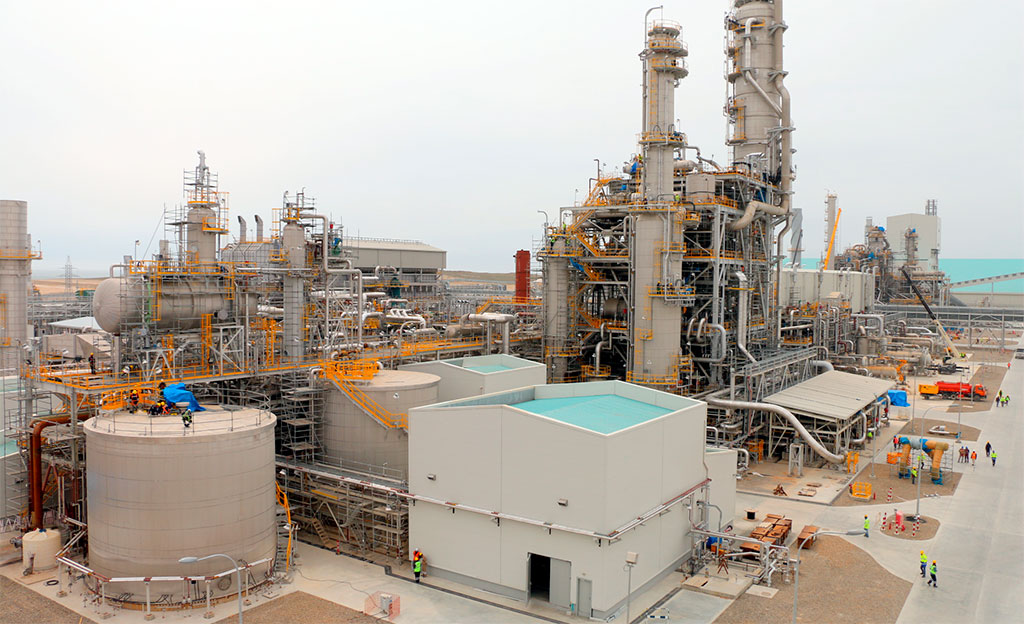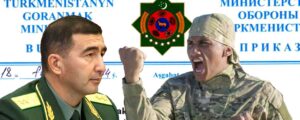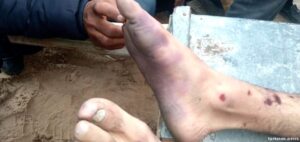
Travellers Held Up for Hours While Turkmen, South Korean Presidents Visit Petrochemicals Plant
21.04.2019
Turkmenistan is reconstructing the 225-km highway from the city of Turkmenbashi (formerly Krasnovodsk) on the Caspian Sea coast to the border with Kazakhstan, Deputy Prime Minister Dadebay Amangeldyev announced at a meeting of the cabinet of ministers on April 5.
The road with the necessary infrastructure “will enable an increase in trade, and in goods and passenger traffic between the western and northern regions of the country, and also with neighboring states,” the Turkmenistan state news agency reported.
Meanwhile, since May 2018 the Temir-baba checkpoint on the Turkmen-Kazakh border has been closed to Turkmen citizens, even if they hold an entry visa for Kazakhstan. In order to visit their relatives in Zhanaozen, Aktau or other cities in Kazakhstan’s western Mangystau region, residents of Balkan region have to travel to Ashgabat, fly from there to Almaty, and then travel back across the whole of Kazakhstan. It means a trip of over 4,000 km instead of the more direct 400 km.

“You can leave only through Ashgabat,” Turkmen migration service employees tell travelers at the Temir-baba border checkpoint.
What does this mean for residents of Balkan region? A resident of Garabogaz (formerly Bekdash) used to be able to take one taxi to the border, and then another to cover the 200 kilometers to Zhanaozen. The road to Aktau, the center of Mangystau region, was 360 km. This meant that residents of Garabogaz could reach their relatives’ homes in under six hours. Since residents of Balkan region did not need visas at that time, the whole trip cost between 50 and 60 dollars.
Everything is far more complicated now. First, the would-be traveler has to go to Ashgabat for a visa. More often than not residents of Garabogaz, and the whole region, travel to the capital by taxi, a nearly 800 km trip that costs around 200 manats ($10.5 at the market rate). From there they fly to Almaty. Flights are three times a week and a ticket costs around $170. From Almaty to Aktau they take another plane.
“Depending on the airline, a one-way ticket for May 15, for example, costs between $115 and $265,” a resident of Garabogaz told turkmen.news. “It’s a long, exhausting, and expensive journey, which not everyone in our relatively poor village can afford. We can no longer just up and go to family weddings or funerals, as we used to.”
Residents of Balkan region wonder why their lives have been made so difficult in a country where the president himself has proclaimed the slogan “The state is for the people.”
Turkmen.news observers think there are several reasons for Turkmenistan unilaterally ceasing implementation of the agreement on reciprocal travel.
First, the country’s authorities are extremely wary of contacts between residents of Balkan region and the population of the restless city of Zhanaozen, and Mangystau region as a whole. That’s where oil workers formed a protest movement in 2011 to campaign for an increase in wages. Dissatisfaction developed into unrest and clashes with law-enforcement in which at least 16 people died. Zhanaozen is a city with a high concentration of Oralmans, Kazakhs repatriated from Turkmenistan who returned to their historical motherland under a state program. Many of the returnees retain strong ties with friends and relatives in Balkan region.
Second, the authorities of Turkmenistan try to use bans and restrictions to cut down on the number of people traveling as “dollar tourists.” These are people who use their bank cards abroad to withdraw hard currency from their manat bank accounts. This money is then exchanged on the black market in Turkmenistan at a rate 5.5 times higher than the official state rate. Moreover, people take the bank cards of their friends, neighbors, colleagues, and anyone else who would like to have hard cash in their hands for a modest fee.
Ordinary residents of Balkan region don’t need to be politicians or state officials to know that no good will come of the policy of isolation. Not just the local people, the whole country and its economy suffer from the bans and restrictions. By closing the border, the authorities have in effect killed off all border trade, depriving many, including their own Turkmen citizens, of their modest income from sales and services to travelers and tourists.
Local residents reacted positively to news of the reconstruction of the road from Turkmenbashi to Kazakhstan, as some may be able to find temporary work there. But most of the people of Balkan region are skeptical — increases in trade and in goods and passenger traffic require the simplification of the border crossing and customs process, not restrictions on travel for local people and obstacles to shuttle trade.
However, rumors are rife in Garabogaz that traveling back into Turkmenistan might soon be possible only via the point of departure – in other words via Ashgabat or the Farab checkpoint on the border with Uzbekistan.
Azat Hatamov reporting from Garabogaz

21.04.2019

01.12.2023

23.11.2021

Upmarket Bar in Ashgabat Closed After Brawls Involving President’s Cousins
08.04.2024

Turkmenistan’s Defense Minister Deprived Officers From Housing Entitlement Despite Widespread Resignations
28.02.2024

Murder and Suicide at Troubled Turkmen School
28.02.2024

Turkmen Prosecutor’s Office Claims Baloch Detainee’s Fatal Wounds Were Self-Inflicted
01.02.2024

Young Man Tortured to Death by Law-Enforcement Officers in Turkmenistan (video)
21.12.2023
Tell us!
Add comment
your e-mail will not be published